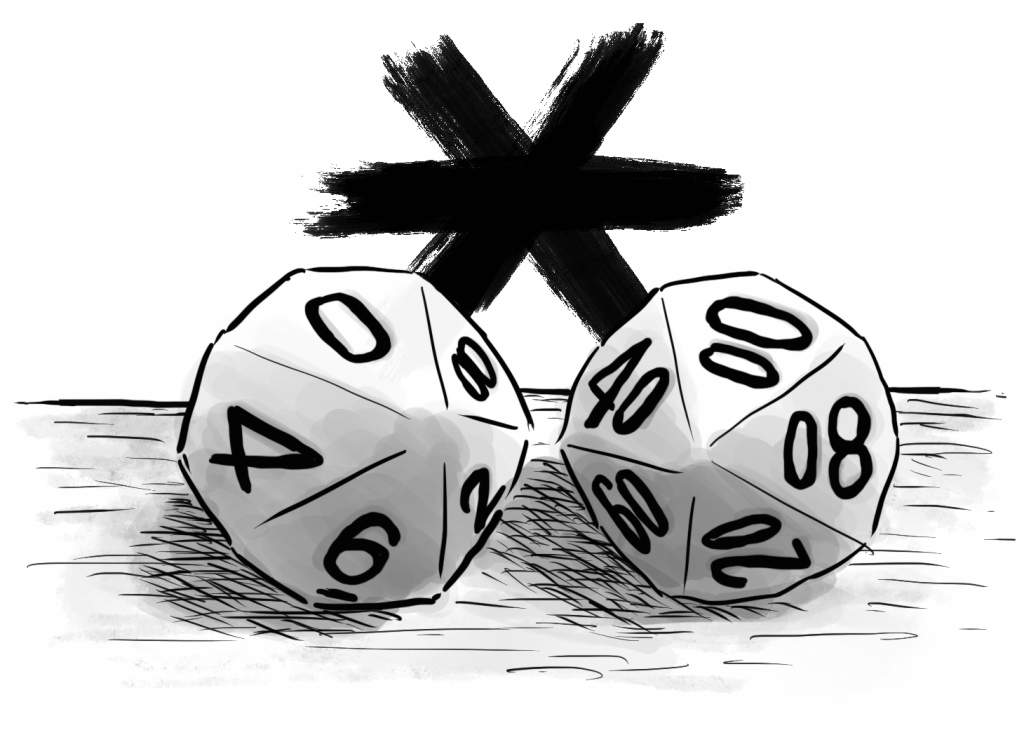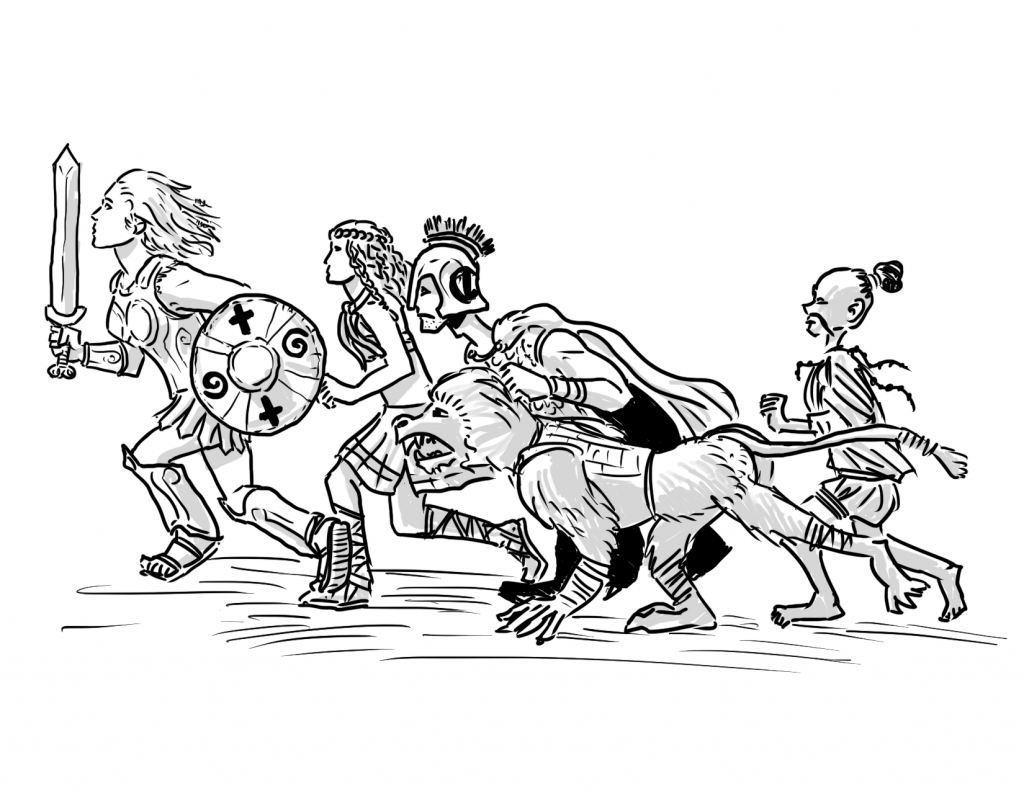
Runic Rants is an irregular series of thoughts, opinions, and experiments about RuneQuest.
One of the most common skill rolls in a fantasy game are the ubiquitous “perception” and “stealth” rolls, respectively for spotting someone or something sneaking up on the Adventurers, and for the Adventurers to sneak up on someone or something undetected. In RuneQuest, these skills are Scan and Move Quietly.
A basic approach for these situations is to just ask every player to roll under their skill score. If any player succeeds with a Scan roll, they have a good chance of spotting the enemy and can warn everybody else immediately. On the other hand, if any player fails their Move Quietly roll, they have good chance of being discovered, which probably means that the entire party gets spotted if they are moving together.

In practice, it’s probably a bit more complicated. There might be any number of special circumstances. There might be some Adventurers that are on their own, separate from the group. And of course the NPCs or creatures may oppose the players’ rolls with their own Move Quietly or Scan. But we’ll look at some of these factors in a future Runic Rant… for now, let’s discuss the basic premise of this kind of group roll.
Compounding Chances
The main problem with asking every player to make a roll is that these rolls are made individually, but the outcome affects the group. As a result, the chances of each roll get combined with the other rolls, and the overall chances of the group to spot an enemy or to sneak past one are vastly different from the percentages on the character sheet.
For instance, imagine that you have a party of four Adventurers, each with 40% in Scan. When rolled together, there is an 87% chance that at least one of the Adventurers succeeds their Scan roll, which means there’s a high chance of the group succeeding even though they all have a somewhat low Scan score. Conversely, imagine that all four Adventurers have 60% in Move Quietly. When rolled together, there’s only a 13% chance that they all succeed… at least one Adventurer will most probably fail, making the whole group fail!
Group Roll Rules
The RuneQuest rulebook doesn’t include group roll rules, so that’s a great opportunity to make our own! Over my short time as a RuneQuest gamemaster, I’ve settled on a system where one Adventurer (the “leader”) performs the “main roll”, and the others can optionally use the augment rules to help out. And since the lead Adventurer can also augment their own roll, our party of four can effectively stack up to five augments on top of the main roll.
For instance, while trying to sneak past a Lunar patrol, we would have:
- Some characters not participating in the group roll. They just hang back and follow the others, or maybe they are busy with other things such as casting spells or taking care of companion NPCs.
- Some characters can roll an augment using a Rune (the Darkness Rune is always good for discretion), a Scan roll (to help the leader by pointing out where the sentinels are, or spotting noisy dry leaves on the ground), a Listen roll (to hear that soldiers are coming from the left), an Animal Lore (to make animal sounds as a diversion), and so on.
- The leader can roll their own augment, and then rolls the main challenge skill, which would be Move Quietly in this case.
Having too many characters trying to augment the leader’s roll are bound to create mixed results: failed rolls will cancel out successful rolls’ augments. This is a feature, not a bug! As the saying goes, “too many cooks in the kitchen…“. On the other hand, if the first couple augments have failed, a couple characters who weren’t planning to get involved might suddenly put in their 2 clacks… and might even make things worse!
What About Experience?
Many people assume that you simply get an experience check when you make a successful roll, in which case the group roll rules above have the problem that only one Adventurer (the leader) gets a check. But the rules around obtaining an experience check in a skill are vague on purpose in RuneQuest. Page 415 states:
The gamemaster may tell the player to check the box […] when the adventurer succeeds in using the ability in conditions of stress.
(…)
The ability to reward or deny an experience check is an important responsibility for the gamemaster.
Some people interpret the first part in a rather generic way, giving out experience checks also for most augments. In that case, all players would get an experience check in whatever they used for augmenting, assuming they succeeded. But even if your group doesn’t typically give experience checks for augments, the rules do support the gamemaster giving some out in some specific situations like group rolls.
One optional rule I’m considering adding is to let any non-leader player choose to get an experience check in the “main” skill (Move Quietly in the example above) rather than in whatever ability they used to augment the leader. Helping out in dramatic situations can be a good way to get experience in a new skill.
Using Group Rolls
The gamemaster should still use group rolls only when appropriate. There are several situations for which “every player rolls” works perfectly well, especially when you want to increase the chances of success. Typical examples of “every player rolls” in my games are:
- Insight rolls, while talking to an NPC: each Adventurer may end up with a different opinion of their interlocutor, and it’s not like they can freely exchange notes in front of the NPC anyway. But one Adventurer may be able to take control of the conversion, persuaded that they can “read” the other person… whether that’s true or not.
- Most knowledge rolls: skills such as Homeland Lore, Cult Lore, or Customs are usually rolled individually in my games, with different bonuses or penalties depending on the specific topic (for instance, I typically give +20%/+30% if the topic relates to the same clan/tribe or cult/sub-cult as each specific Adventurer). For investigative scenarios, each success in a knowledge roll can even let the gamemaster drop one additional clue or piece of information.

These group roll rules are really just another tool in the toolbox for the gamemaster — use them when it feels right!
If you have any comment about this Runic Rant, or some ideas for a future installment, please send them to us!


2 comments on “Runic Rants: Group Rolls”